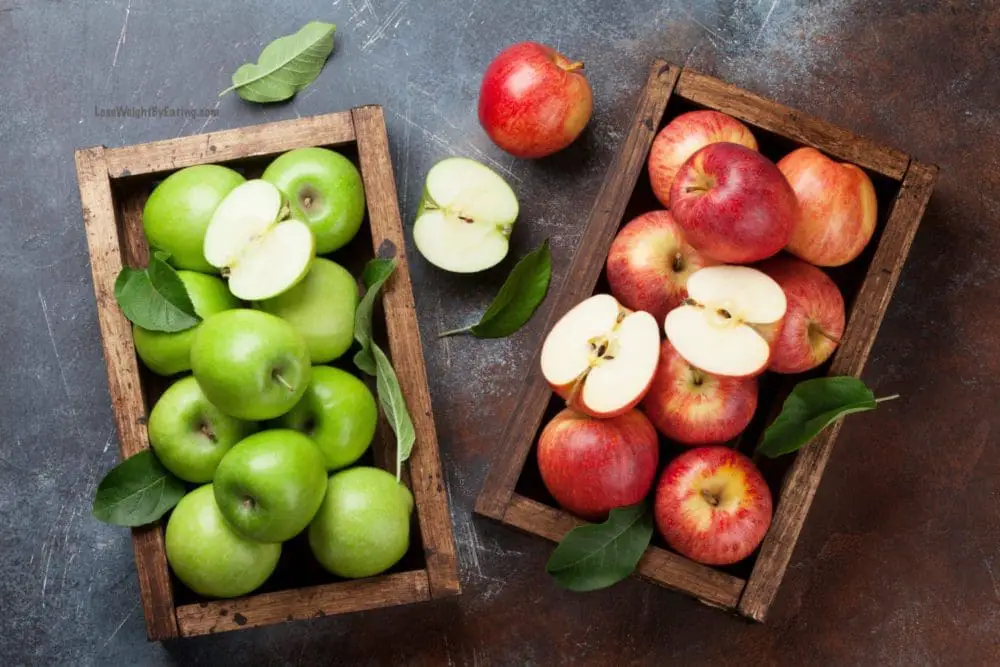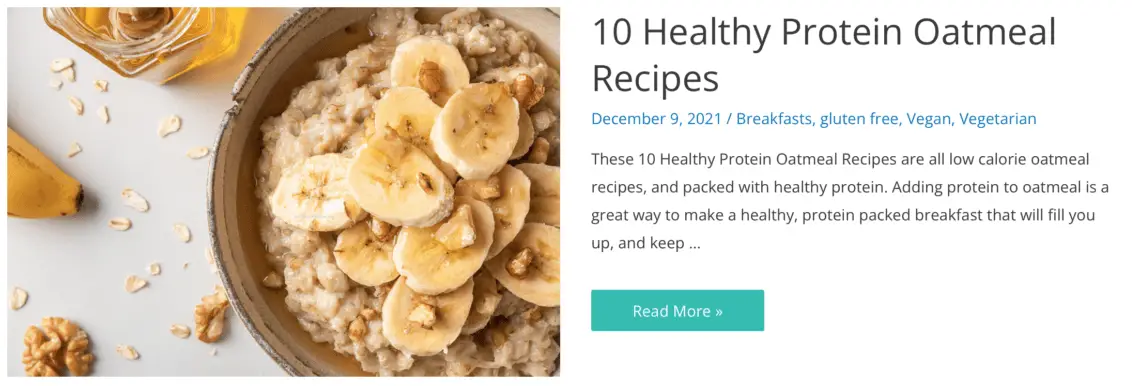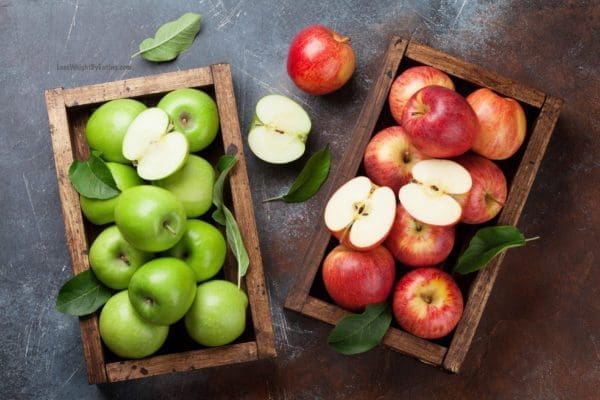This comprehensive guide on the number of calories in an apple with supply you with everything you need to know about the nutrition and calories in apples.
In this article, I’ll dive deep into the calorie content of apples, the benefits of consuming this fruit, and the different types of apples available in the market. Plus supply you with some low calorie apple recipes you can enjoy right away!


Calories in Apples
Apples are known for their low calorie content, making them an excellent fruit for weight loss and maintaining a healthy diet.
On average, a medium-sized apple contains around 95 calories, with the majority of the calories coming from carbohydrates and fiber.
Apple Nutrition Facts:
Apples are a great source of important vitamins, minerals, and fiber, making them a nutritious and healthy fruit to include in your diet. Here are some nutrition facts about apples:
- Calories: A medium-sized apple contains approximately 95 calories.
- Carbohydrates: A medium-sized apple contains about 25 grams of carbohydrates, including 19 grams of sugar and 4 grams of dietary fiber.
- Fiber: Apples are a good source of dietary fiber, with a medium-sized apple containing 4 grams of fiber, or about 14% of the recommended daily intake.
- Protein: Apples are not a significant source of protein, with a medium-sized apple containing less than 1 gram of protein.
- Vitamins: Apples contain important vitamins, including vitamin C and vitamin K.
- Minerals: Apples are a good source of minerals, including potassium.
- Antioxidants: Apples contain various antioxidants, such as quercetin and catechin, which can help protect your cells from damage and reduce your risk of chronic diseases.
- Hydration: Apples are also high in water content, making them a great way to stay hydrated throughout the day.
When choosing apples, aim for those that are firm, unbruised, and free of cuts or punctures. Apples can be stored at room temperature for up to a week or in the refrigerator for up to a month.
Health Benefits of Apples
Apart from being low in calories, apples are also rich in nutrients that are essential for maintaining a healthy body.
Apples are a good source of dietary fiber, which helps in regulating digestion and preventing constipation. They are also rich in antioxidants, which protect the body from free radicals that can cause cellular damage and lead to various diseases.
10 Health Benefits of Apples:
- Promotes healthy digestion: Apples are rich in dietary fiber, which helps to keep your digestive system running smoothly and prevents constipation.
- Helps lower cholesterol levels: The fiber in apples can help to reduce cholesterol levels in the blood, which can lower the risk of heart disease.
- May reduce the risk of cancer: Apples contain antioxidants that may help to prevent cancer by protecting cells from damage.
- Helps to regulate blood sugar levels: The fiber in apples can help to slow down the absorption of sugar into the bloodstream, which can help to prevent spikes in blood sugar levels.
- May improve brain function: Studies have shown that the antioxidants in apples may help to protect the brain from damage and reduce the risk of cognitive decline.
- Supports a healthy immune system: Apples contain vitamin C, which is important for maintaining a healthy immune system and fighting off infections.
- Helps to maintain a healthy weight: Apples are low in calories and high in fiber, which can help to promote feelings of fullness and prevent overeating.
- May improve bone health: Apples contain a flavonoid called phloridzin, which has been shown to improve bone density and reduce the risk of osteoporosis.
- May improve lung function: Research suggests that eating apples may help to improve lung function and reduce the risk of respiratory diseases like asthma.
- Promotes healthy skin: The vitamin C and antioxidants in apples can help to protect the skin from damage and promote healthy skin cell growth.
Different Types of Apples
Apples come in a variety of colors and flavors, making them a versatile fruit that can be used in a variety of dishes.
Some popular types of apples include Fuji, Gala, Honeycrisp, and Granny Smith. Each type of apple has a distinct flavor and texture, making it suitable for different culinary purposes.There are many different varieties of apples available, each with its own unique flavor, texture, and nutritional profile.
Common Types of Apples:
- Red Delicious: This variety is one of the most popular types of apples in the United States. A medium-sized Red Delicious apple contains around 95 calories.
- Granny Smith: Granny Smith apples are known for their tart, crisp flavor. A medium-sized Granny Smith apple contains around 80 calories.
- Gala: Gala apples have a sweet, mild flavor and are often used in baking. A medium-sized Gala apple contains around 70-80 calories.
- Honeycrisp: Honeycrisp apples are known for their juicy, crunchy texture and sweet flavor. A medium-sized Honeycrisp apple contains around 95 calories.
- Fuji: Fuji apples have a sweet, crisp flavor and are often used in salads and snacks. A medium-sized Fuji apple contains around 80-90 calories.
It’s worth noting that the calorie counts for different types of apples can vary depending on the size and ripeness of the fruit. However, all types of apples are generally low in calories and make a great choice for a healthy snack or ingredient in a meal.
Calories in All Varieties of Apples
The number of calories in apples varies depending on the variety and size. Here are the average calories in some popular varieties of apples:
- Small apple (149g): 77 calories
- Medium apple (182g): 95 calories
- Large apple (223g): 116 calories
- Golden Delicious apple (182g): 95 calories
- Granny Smith apple (182g): 95 calories
- Red Delicious apple (182g): 95 calories
- Gala apple (182g): 95 calories
- Fuji apple (182g): 95 calories
As you can see, the calories in apples are relatively low, making them an excellent snack option for those trying to watch their calorie intake.
How many apples should I eat?
Apples are a healthy and nutritious fruit, but like all foods, they should be consumed in moderation. The amount of apples you should eat depends on your individual needs and dietary goals.
The recommended daily intake of fruits and vegetables varies depending on age, gender, and activity level. However, a general guideline is to aim for at least 5 servings of fruits and vegetables per day, which is equivalent to 2 cups of fruit.
When it comes to apples specifically, the United States Department of Agriculture (USDA) recommends consuming 1 to 2 cups of fruit per day, which can include apples as well as other fruits.
It’s important to note that while apples are a healthy food, they do contain natural sugars and can be high in calories if consumed in large quantities. Eating too many apples can lead to weight gain and other health issues.
To get the most health benefits from apples, aim to incorporate them into a balanced and varied diet along with other fruits and vegetables. Enjoying one or two apples per day as part of a healthy diet is a good way to reap the many health benefits of this delicious fruit.
How to Incorporate Apples into your Diet
Apples can be eaten raw or cooked, and they can be used in a variety of dishes. Some popular ways to incorporate apples into your diet include adding them to salads, using them as a topping for oatmeal or yogurt, or incorporating them into baked goods like pies and muffins.
Apples can also be used to make apple cider or apple juice, which are popular beverages around the world.
I’ve included 25 healthy apple recipes that are all low in calories and packed with nutrition!
Low Calorie Apple Recipes


25 Healthy Apple Recipes
Ingredients
- Fat Burning Apple Cinnamon Smoothie
- 5 Apple Juice Diet Recipes
- Aple Pie ACV Shot
- Instant Pot Apple Sauce
- Apple Cinnamon Mocktails
- Apple Pear Cobbler
- Low Calorie Apple Martini
- Crockpot "Fried" Cinnamon Apples
- Low Calorie Apple Rum Drinks
- Starbucks "Copycat" Apple Smoothie
- Homemade Apple Cider
- Low Calorie Stuffed Baked Apples
- Crockpot Apple Butter
- Low Calorie Apple Crumble
- Weight Loss Apple Cinnamon Water
- Green Juice Shots
- Apple Pie Parfait Cups
- Apple Cinnamon Protein Oatmeal Recipe
- Apple Cinnamon Oatmeal Pancakes Recipe
- Apple Spinach Salad
- No Mayo Waldorf Salad
Instructions
- Pick a few recipes that sound yummy.
- Click on the links and print out the free recipe cards.
- Get cooking, blending or baking!
Nutrition
FAQ – Apple Nutritional Q&A
Yes, apples can be a great addition to a weight loss diet. They are low in calories, high in fiber, and can help keep you feeling full for longer periods of time. However, it’s important to remember that weight loss requires a calorie deficit, so it’s important to incorporate apples as part of a well-balanced diet.
Like any food, it’s possible to eat too much of a good thing. While apples are generally considered a healthy food, eating too many can lead to an excess intake of sugar and carbohydrates, which can have negative effects on blood sugar levels. Additionally, some people may be allergic to apples, so it’s important to monitor for any adverse reactions.
Organic apples are grown without the use of synthetic pesticides and fertilizers, which can be better for the environment and potentially better for human health. However, there is limited evidence to suggest that organic apples are significantly more nutritious than conventionally-grown apples.
Apples contain soluble fiber, which can help lower cholesterol levels by reducing the absorption of cholesterol in the bloodstream. Incorporating apples into a heart-healthy diet can be a beneficial strategy for managing cholesterol levels.
Apples contain antioxidants, which can help protect against cellular damage and reduce the risk of chronic diseases, including cancer. However, more research is needed to fully understand the relationship between apple consumption and cancer prevention.
Final Thoughts
In conclusion, apples are a low calorie and nutrient-rich fruit that can be used in a variety of dishes. Whether you eat them raw or cooked, apples are an excellent addition to any diet.
So next time you’re looking for a healthy snack, reach for an apple and enjoy all the benefits it has to offer!
What to Read Next:






Lose Weight By Eating Cookbooks


Share This Article:


Article History:
- Originally written and posted on March 30, 2022 by Audrey Johns
- Updated on March 7, 2023 by Audrey Johns
- Updated on April 8, 2023 by Audrey Johns
